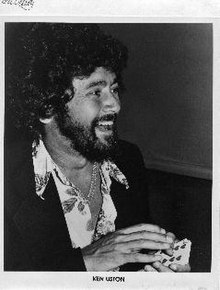Ken Uston
| Kenneth Senzo Usui (Ken Uston) |
|
|---|---|
 |
|
| Born |
Kenneth Senzo Usui January 12, 1935 New York City |
| Died | September 19, 1987 (aged 52) Paris, France |
| Nationality | American |
| Occupation | Professional gambler, writer |
| Spouse(s) | Betty |
| Children | Beth Anne Uston, Katie Uston, John Uston |
Ken Uston (January 12, 1935 – September 19, 1987) was a famous blackjack player, strategist, and author, credited with popularizing the concept of team play at blackjack. During the early to mid-1970s he gained widespread notoriety for perfecting techniques to do team card counting in numerous casinos worldwide, earning millions of dollars from the casinos, with some bets as high as $12,000 on a single hand. He then became famous for being banned from casinos around the world, and thus became a master of disguise as he would adopt various costumes in order to conceal his true identity and still be able to play. He is also known for filing a high-profile lawsuit against these casinos, and successfully received a ruling from the New Jersey courts that absent a valid New Jersey Casino Commission regulation excluding card counters, casinos could not ban someone simply for counting cards at blackjack. In response, many casinos changed their systems, increasing the number of decks in games, or changing rules to increase the house edge. In the early 1980s, Uston also authored several popular books on video games and personal computers. He was the subject of a 1981 segment on 60 Minutes, and in 2005, he was the subject of the History Channel documentary, "The Blackjack Man".
Uston was born Kenneth Senzo Usui in New York City, the oldest of three children born to Elsie Lubitz, a native of Austria, and Senzo Usui, a Japanese immigrant and businessman. At the age of 16, Uston was accepted to and henceforth began attending Yale University, where he was a member of Phi Beta Kappa. Shortly after graduating from Yale, he went on to earn an MBA from Harvard University. He became district manager of the Southern New England Telephone Co., then a senior management consultant with Cresap, McCormick & Paget in San Francisco, where he relocated with his wife and two daughters. After several years in consulting, he became corporate planning manager for American Cement in Los Angeles before returning to San Francisco where he became a Senior Vice-President at the Pacific Stock Exchange. On weekends, beginning in his years at Cresap, he read Thorp's Beat the Dealer and began to spend time in the casinos, becoming what the Cleveland Plain Dealer called "a genius card-counter". Uston was also a talented musician, proficient on the bass as well as the piano. He was frequently asked to play in several San Francisco jazz clubs.
...
Wikipedia
